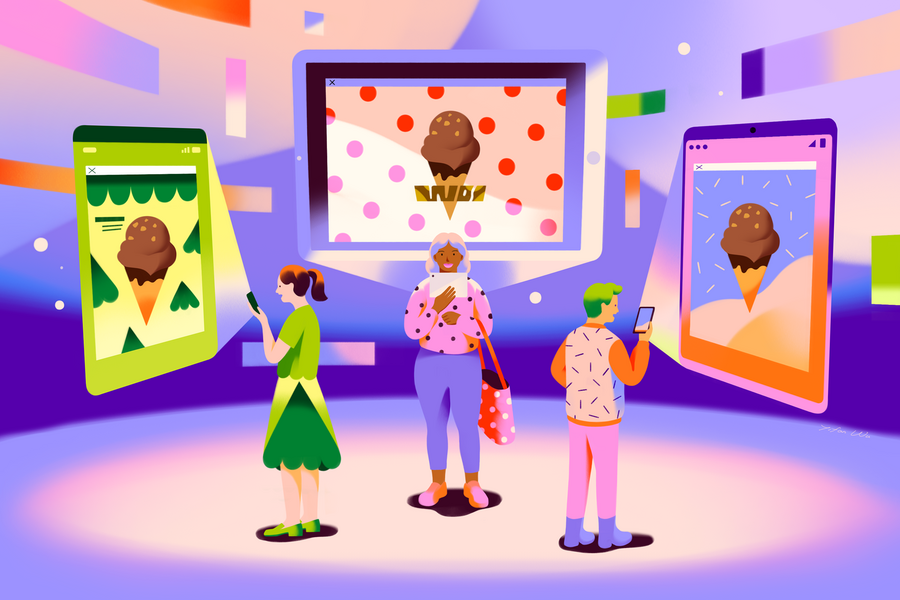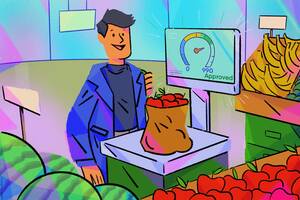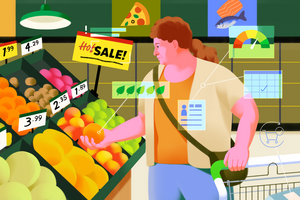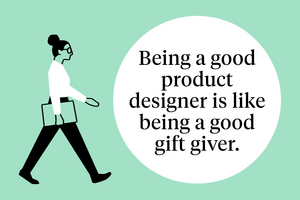Marketing Jul 1, 2025
Knock Knock. Who’s There? Generative AI.
Learning that a joke, a story, or art came from AI boosts our confidence in our creativity.
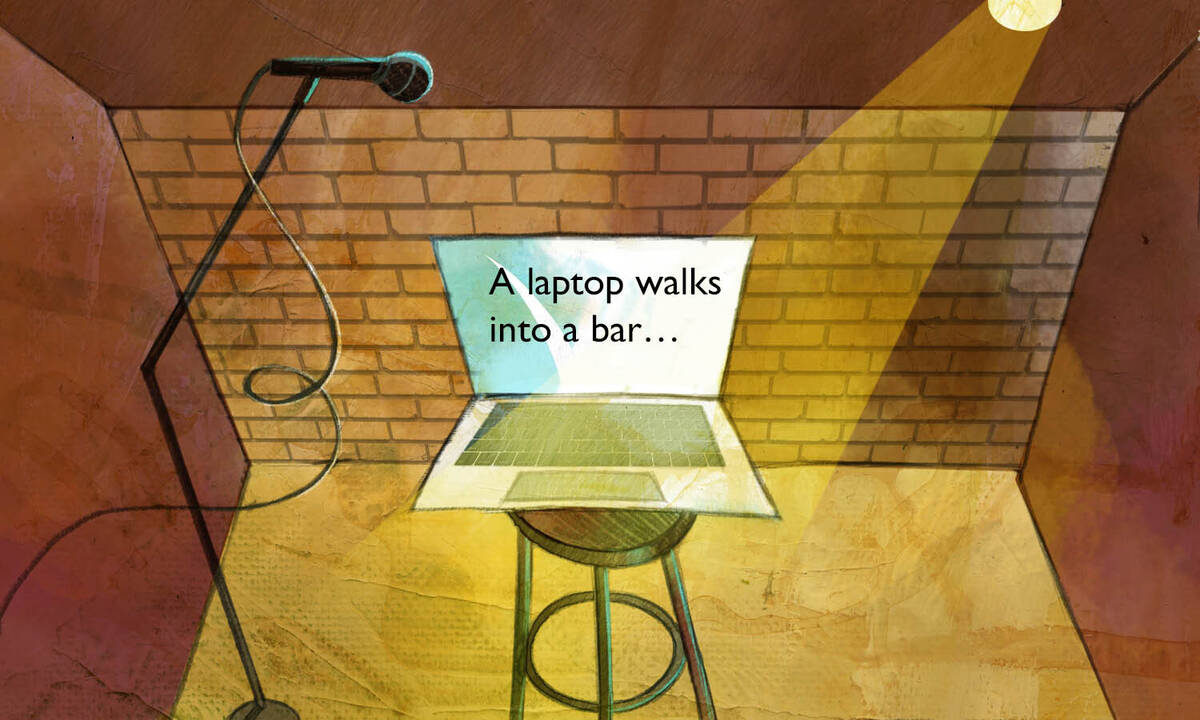
Yevgenia Nayberg
I told my plants I love them, and now they’re growing like they’re trying to escape.
If you heard a comedian deliver that joke at a club, you might chuckle, or groan, or even toss out a heckle. But what if you found out the performer got the material from artificial intelligence rather than their own brain? Would that make you feel more confident in your own ability to do stand-up comedy?
That’s the line of questioning posed in new research by Jake Teeny, a Kellogg assistant professor of marketing. He and collaborator Taly Reich at NYU had been intrigued by an effect Reich had observed about how people respond to AI-generated content.
So, Teeny and Reich ran a series of experiments in which they assessed people’s self-confidence in their creative ability after exposure to creative works described as either produced by AI or created by a human. The researchers consistently found that people were more confident in their ability to complete a creative task after they saw the exact same work being credited to AI versus a human.
In large part, this response stemmed from a preconceived notion that AI is less creatively capable than humans. “If you take the exact same piece of high-quality or low-quality work, you will see this effect—that people think that AI in general is worse at producing creative content. So when people compare themselves to AI after seeing the work, it boosts their confidence in their own creative abilities,” Teeny says.
The results could be significant not just for art but for innovation. As many advocates envision a future where AI enhances—not replaces—human abilities, it’s crucial to understand how exposure to AI-generated work affects the way people view their own work and abilities.
“From a practical standpoint, self-confidence is such an important driver of innovation,” Teeny adds, “and past research shows so much of our behavior is driven by the simple perception that we are capable of doing that behavior, whether it’s to undertake a piece of creative work or apply for a dream job.”
A creative confidence boost
The researchers conducted multiple studies to understand how seeing work supposedly created by AI influences people’s self-confidence.
In one experiment, hundreds of people read a joke about an antidepressant pill feeling down (Why was the Lexapro pill feeling down? Because it had a depressing job!). Some learned that generative AI had written the joke, whereas others were told that a human had written it. The participants then rated the joke writer’s sense of humor and their own ability to come up with a better joke.
People said the writer had a worse sense of humor—by about 16 percent—when they believed it was written by AI versus a human. In addition, people in the AI group were about 15 percent more confident than people in the human group about being able to create a better joke.
In a parallel study, hundreds of people looked at a work of visual art and learned that it had been created by either AI or a human. Those who believed the artwork was AI-generated subsequently reported greater confidence in their own drawing ability—and considered the illustrator less skilled—than did those who believed it was created by a human artist.
“Much of our self-perceptions are based on how we compare ourselves to others.”
—
Jake Teeny
Other studies showed that these same effects emerged for a captioned cartoon, a short story, even a highly praised poem. Moreover, people were not only more confident in their ability to do these creative activities after thinking that AI (as opposed to a human) generated it, but that increased confidence also made people more willing to engage in the creative activities themselves.
A semi-human comparison
So, what’s behind this effect?
Teeny points to the well-established psychological theory of social comparison.
“Much of our self-perceptions are based on how we compare ourselves to others,” he says. “If we’re exposed to people we believe are really good at something, we may think, ‘Oh, I’m not as good at that [task] as I thought I was.’ But if we’re exposed to people who do something poorly or who we believe are less skilled, we think, ‘I’m actually pretty good at that.’”
But for social comparison to take place, there has to be some perceived similarity between the person making the judgment and the target of comparison. “If I see my two-year-old daughter struggling to complete a puzzle, it’s not going to make me think I’m exceptionally good at puzzles,” Teeny says.
Even though generative AI isn’t human, people tend to view it as such when comparing its abilities to their own. “Generative AI acts and thinks and even speaks like another person, so we think of it as a kind of semi-human, and we compare our abilities to it like it was another human,” Teeny says.
Consequently, because many people hold a preconceived notion that AI isn’t particularly good at creative work, exposure to AI-generated content can boost their self-confidence.
Stimulating confidence and creativity
The findings have practical implications across a wide range of settings.
In marketing, for example, “if you’re trying to get people to come up with a new marketing idea, you could show them what generative AI produced and say, ‘See if you can’t come up with something better,’” Teeny says. “That would motivate them more than showing them something another team member produced. It gets the confidence ball rolling.”
Similarly, in education, showing students work that AI has generated might boost their confidence with completing assignments, whether that’s writing a paper, producing artwork, or coming up with new uses for products.
Yet increased confidence doesn’t necessarily mean increased capability or better output.
For one of the studies, the researchers showed people a cartoon caption and told some of them it was generated by AI and others that it was written by a human. Those in the AI group were more confident in their ability to write funny captions and more likely to rate their captions as funny than participants who were told a human had written the original caption. However, when independent raters reviewed the captions that all participants wrote, the raters said the captions written by both groups were equally funny.
“Showing people AI-generated content may help get them to try things or make an effort; it gets the train to leave the station,” Teeny says. “But it may not help it speed up or reach a different destination.”
Sachin Waikar is a freelance writer based in Evanston, Illinois.
Reich, Taly, and Jacob D. Teeny. 2025. “Does Artificial Intelligence Cause Artificial Confidence? Generative AI as an Emerging Social Referent.” Journal of Personality and Social Psychology.
